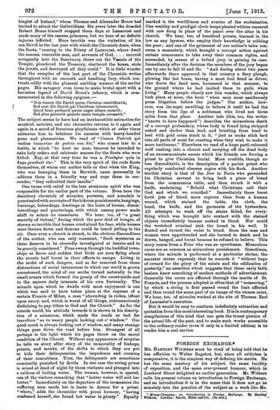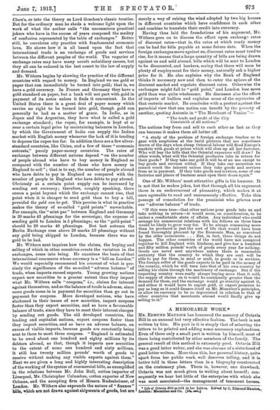FOREIGN EXCHANGE.*
MR. HARTLEY WITHERS must be tired of being told that he has affinities to Walter Bagehot, but, since all criticism is comparative, it is the simplest way of defining his merits. He has the same mastery of his subject, the same lucidity of exposition, and the same ever-present humour, which in Lombard Street delighted an earlier generation. Mr. Withers' calls his present volume an introduction to Foreign Exchange, and an introduction it is in the sense that it does not go as' minutely into the practice of the subject as a work like Mr.
• Mowry-Changing r an introduction to Forsign Eirchange. By Hartley
Withers. London Smith, Elder and Co. (Ss. net.]
•
Clare's, or into the theory as Lord Goschen's classic treatise. But for the ordinary man he sheds a welcome light upon the work of what the author calls "the unconscious practical jokers who have in the course of years composed the medley of confusion represented by the table of exchanges." Better still, he correlates city practice with fundamental economic laws, He shows how it is all based upon the fact that international trade is an 'exchange of goods and services between the different peoples of the world. The vagaries of exchange rates may have many occult subsidiary causes, but they all can be reduced in the last resort to the law of supply and demand.
Mr. Withers begins by showing the practice of the different countries with regard to money. In England we use gold or paper that can immediately be turned into gold; that is, we have a gold currency. In France and Germany they have a gold standard on paper, but a bank will not part with gold in payment of its notes unless it finds it convenient. In the United States there is a great deal of paper money which carries no right to be turned into gold, though gold can generally be had as a matter of grace. In India, as in Japan and the Argentine, they have what is called a gold exchange standard ; the rupee, for example, is kept at or near a certain legal price by maintaining balances in London, by which the Government of India can supply the Indian market with English money whenever the lack of it is tending to depress the rupee too far. In addition there are a few silver- standard countries, like China, and a few of these " economic outcasts," purely paper-money countries. The rates of exchange between different nations depend " on the number of people abroad who have to buy money in England as compared with the number of those who have money in England to sell"; that is to say, the number of people abroad• who have debts to pay in England as compared with the number of people in England who have debts to pay abroad. Obviously at a certain point supply can be increased by sending out currency ; therefore, roughly speaking, there comes a point beyond which the exchange cannot rise, that point when it is cheaper to send gold than to buy a bill, provided the gold can be got. This proviso is what in practice makes the theory of so-called " gold points " unworkable. For example, the "mint par" between England and Germany is 20 marks 43 pfennings for the sovereign; the expense of sending gold to London is 5 pfennings ; so the " gold-point " should be 20 marks 48 pfennings. But last autumn the Berlin Exchange rose above 20 marks 53 pfennings without any gold being shipped to London, because there was no gold to be had.
Mr. Withers next inquires how the claims, the buying and selling of which in other countries create the variation in the exchanges, come into being. He examines the basis of that international commerce whose currency is a "bill on London." We would especially recommend his account of what is pre- cisely the significance of the so-called " adverse balance " of trade, when imports exceed exports. Young growing nations export new securities to a greater extent than they import what Mr. Withers calls "coupons," i.e., claims for interest against themselves, and so the balance of trade is adverse, since more goods come in in payment for securities than go out in payment for coupons. More developed nations, who have slackened in their issues of new securities, import coupons faster than they export securities, and so have a favourable balance of trade, since they have to meet their interest charges by sending out goods. The old developed countries, the lending and capitalist nations, export coupons faster than they import securities, and so have an adverse balance, an excess of visible imports, because goods are constantly being sent to them to meet these coupons. " England is estimated to be owed about one hundred and eighty millions by its debtors abroad, so that, though it imports new securities to the extent of some one hundred and sixty millions, it still has twenty million pounds' worth of goods to receive without making any visible exports against them." Next we are given a long and highly interesting description of the working of the system of commercial bills, as exemplified in the relations between Mr. John Bull, cotton importer of Liverpool, Mr. Christopher Columbus, cotton exporter of New Orleans, and the accepting firm of Messrs. Rudesheimer, of London. Mr. Withers also expounds the nature of "finance" 108, which are not drawn against shipments of goods, but are
merely a way of raising the wind adopted by two big houses in different countries which have confidence in each other and combine to translate their credit into currency.
Having thus laid the foundations of his argument, Mr. Withers goes on to discuss the effect upon exchang3 rates of discount rates—that is, the rates at which ready money can be had for bills payable at some future date. When the foreign exchanges move against us, discount rates must tend to rise, for it means theta large quantity of bills are being drawn against us and sold abroad, bills which will be sent to London to be discounted, and bankers, seeing that there will soon be plenty of employment for their money, naturally ask a higher price for it. He also explains why the Bank of England thinks it necessary now and then to enter the sphere of the discount market and regulate discount rates. Otherwise the exchanges might fall to " gold point," and London lose more gold than was quite wholesome. He discusses also the effect of imports of bullion and explains some of the mysteries of that esoteric market. He concludes with a protest against the parochial view that one nation can benefit by the poverty of another, quoting Antonio in " The Merchant of Venice"- " The trade and profit of the City Consisteth of all nations."
The nations buy from and sell to each other as fast as they can because it makes them all better off.
"A study of the problem of foreign exchange teaches us to gaze with scepticism at tho lurid pictures that are sometimes drawn of the days when cheap Oriental labour will flood Europe's markets with goods at prices which will shut up all her factories, Who will buy the bills that the Oriental exporters will draw ? In other words, what will the Oriental producers take in return for their goods ? If they take our gold it will be of no use except to buy goods and services withal. If they take our securities we cannot remit the interest unless they take goods and services from us in payment. If they take goods and services, some of our factories and places of business must open their doors again."
One of Mr. Withers' most attractive gifts is his humour. It is not that he makes jokes, but that through all his argument there is an undercurrent of pleasantry, which makes it at once agreeable to read and uncommonly effective. Take this passage of consolation for the pessimist who grieves over our " adverse balance" of trade.
"If this were true—that other nations pour goods into us and take nothing in return—it would seem, on consideration, to bo rather a comfortable state of affairs. Any individual who could arrange his commercial relations with his fellows on these lines would be likely to grow very fat. To bo always consuming more than he produced is just the sort of life that would have been found thoroughly pleasant by the Economic Man, as conceived by the older economists.. . . But, in fact, those things do not happen. The other countries of the world have not conspired together to kill England with kindness, and give her a hundred and fifty million pounds' worth of goods every year for nothing. Goods are never sent anywhere unless there is reasonable certainty that the country to which they are sent will be able to pay for them, in meal or malt, in goods or in services. The foreign seller of the goods expects to be paid in the money of the country, which he will turn into that of his own country by selling his claim through the machinery of exchange. But if the importing country were really always buying more than it sold, the supply of claims on it would be continually greater than the demand for them, and the exchange would go steadily against it, and either it would have to export gold, or export promises to pay as long as it could finance itself on Mr. Mieawber's principles, or allow its currency to be so depreciated in relation to that of other countries that merchants abroad would finally give up selling to it."















































 Previous page
Previous page